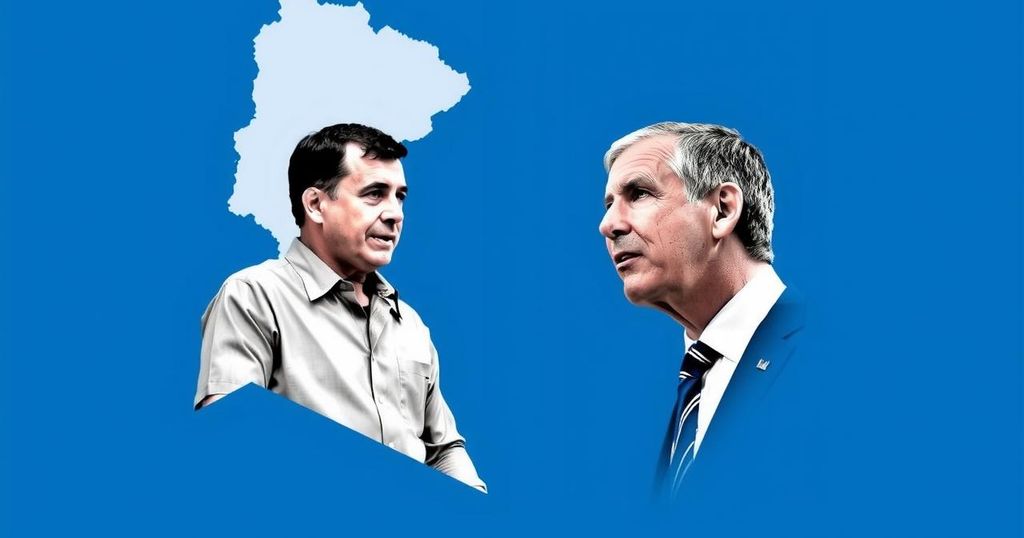Uruguay to Conduct Presidential Run-Off Amidst Moderate Political Climate
Uruguay is poised for a presidential run-off on November 24, featuring leftist candidate Yamandu Orsi against centre-right candidate Alvaro Delgado. Orsi leads the initial voting with 43.2 percent, while Delgado follows with 28 percent. Voter concerns center on rising crime, linked to drug trafficking, amidst a politically moderate landscape that diverges from regional trends. The electorate has also shown disapproval towards proposed referendums on retirement age and police powers.
Polling stations in Uruguay have concluded their operations in a presidential election that diverges from the prevailing political shifts witnessed across Latin America. Predictions from pollsters indicate a probable run-off election next month between two distinct candidates: a leftist former history teacher and a centre-right veterinarian. Yamandu Orsi, representing the centre-left Frente Amplio party and previously serving as a local mayor, is forecasted to face Alvaro Delgado of the centre-right Partido Nacional in the decisive election scheduled for November 24. According to estimates provided by Equipos Consultores, Orsi secured approximately 43.2 percent of the total votes, considerably ahead of Delgado, who garnered around 28 percent. Notably, Andrés Ojeda, a media-savvy lawyer who has drawn comparisons to Argentina’s libertarian President Javier Milei, placed third with estimates ranging between 15.5 to 16 percent. Pre-election surveys indicated that no candidate would attain the necessary 50 percent majority required for a definitive win. Alongside the presidential elections, voters in Uruguay also participated in referendums aimed at lowering the retirement age from 65 to 60 and easing restrictions on police conducting nighttime raids in private residences; however, early exit polls suggest there was widespread rejection of both measures. This election cycle reflects a departure from the pronounced right-left divisions increasingly characteristic of various Latin American nations, with prominent candidates exhibiting considerable policy overlap. The electorate in Uruguay has displayed general satisfaction with the performance of the current government, led by President Luis Lacalle Pou from the Partido Nacional, who enjoys a commendable 50 percent approval rating. Nonetheless, the ruling conservative coalition faces challenges in addressing concerns over crime, particularly given the rise in violence associated with drug trafficking. With a population of 3.4 million, Uruguay’s citizens have voiced serious apprehensions regarding violent crime, signaling a priority for the electorate as they head into the run-off. It should be noted that President Lacalle Pou is constitutionally prohibited from seeking re-election for a consecutive term. Should Orsi claim victory, he may usher in a leftward political shift after five years of conservative governance. Encouragingly, José “Pepe” Mujica, a former president and former guerrilla leader, has joined the campaigning efforts despite his health challenges, symbolizing the continuity and potential revival of leftist ideals in Uruguay’s political landscape.
Uruguay, a relatively small nation in South America with about 3.4 million residents, is experiencing a significant electoral event that highlights its distinct political landscape. Unlike other countries in the region that have witnessed drastic shifts towards the right or left, Uruguay’s political environment remains characterized by moderate candidates who share common policy ground. The current elections have garnered attention due to the impending run-off vote set for November, with voters faced with crucial decisions surrounding not only who will lead the country but also on fundamental issues such as crime and the social policies affecting their daily lives. This election occurs against a backdrop of fluctuating public sentiment regarding crime and governance, reflecting broader societal concerns in a country with one of the highest GDPs per capita in Latin America.
The upcoming presidential run-off in Uruguay highlights the divergence of its political landscape as it resists the polarization seen in neighboring countries. Candidates Yamandu Orsi and Alvaro Delgado will contend for leadership in a race that underscores the populace’s concerns regarding crime and governance. The rejection of the simultaneous referendums further emphasizes the public’s cautious approach to change. Ultimately, this electoral process will not only determine the country’s leadership but may also influence the broader political trajectory of Uruguay in the years to come.
Original Source: www.aljazeera.com




Post Comment